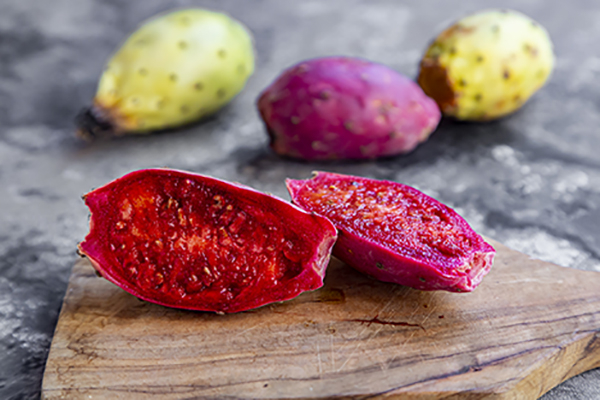
Dr. Mercedes Briones, a researcher at the Universidad Internacional Iberoamericana (International Iberoamerican University, UNIB), is participating in a study that explores the biological properties of betalains from the fruits of the Opuntia cactus, mainly prickly pear cactus, and their possible health benefits.
The most commonly used natural colorants in the food industry include betalains, anthocyanins, carotenoids, riboflavin, and chlorophylls. Anthocyanins, carotenoids and riboflavin are associated with reduced risk of hypertension, type 2 diabetes, certain cancers, aging and cardiovascular disease. Chlorophyll has been studied for its cancer prevention and toxin binding properties. Likewise, its biological activities have been studied in many studies, but betalains have been little studied.
Betalains are nitrogen-containing, water-soluble pigments divided into two subclasses: betaxanthins, which range in color from yellow to orange, and betacyanins, which range from red to violet. Their structure is based on betalamic acid, which is responsible for their color due to their conjugated double bonds. Betaxanthins are ammonium derivatives with different substituents, while betacyanins have a cyclodopa structure with various modifications.
Natural sources of betalains include the fruits of the Opuntia cactus, red beets, dragon fruit, chard and quinoa. They are also found to a lesser extent in other plants such as ulluco (smooth potato), Rivina humilis (coralillo) berries, Malabar spinach (Chinese spinach), water leaf and some Eulychnia cacti. It is important to mention that the main source of betalains is the red beet, but it has some disadvantages because it contains geosmin and pyrazines that give an earthy flavor and limit the range of colors that these pigments can produce. Therefore, other sources have been explored such as pitayas and cactus, mainly prickly pears, which grow in adverse conditions. Although cacti are more common in Latin America, they are also found in Asia, Africa, Australia and the Mediterranean region.
The consumption of fruits and vegetables, which contain betalains, is associated with reduced risk of non-communicable diseases such as obesity, diabetes, cancer and cardiovascular disease. Some studies have highlighted their anticarcinogenic, anti-inflammatory and antioxidant properties. These characteristics make betalains a promising natural alternative to replace synthetic dyes in the food industry. However, more research is still needed to determine their biological properties in human health. Therefore, a study was conducted to explore these benefits in order to provide an overview related to the state of research on betalains extracted from Opuntia cactus and to evaluate their positive impact on the human body.
Relevant findings
Betalains may benefit human health due to their pharmacological properties, such as antilipidemic, anticancer, anti-inflammatory, antioxidant, and antimicrobial effects. Although they are known to improve the body's redox balance, the mechanisms behind their antioxidant effect are not fully understood.
Some research has shown that betalain and similar compounds can prevent the oxidation of LDL cholesterol, which is crucial in the prevention of cardiovascular disease. In addition, betalains have shown anticancer potential by inhibiting cancer cell growth and promoting apoptosis in various cell types through activation of the intrinsic pathway. They also possess anti-inflammatory properties, protecting endothelial cells and reducing inflammation in different experimental models.
On the other hand, although their antimicrobial activity has not been extensively tested, it has been observed that extracts containing betalains can inhibit the growth of certain bacteria. In human studies, betalain-rich supplements have shown positive effects in patients with cardiovascular disease, improving certain health markers. In addition, betalains can influence intestinal motility, demonstrating an inhibitory effect on intestinal muscle contractility in animal models.
Despite the results obtained, further studies in vitro and in animal models, as well as clinical trials are needed to understand absorption, bioavailability and their various health benefits. As science advances, these pigments could play a crucial role in promoting healthier and more sustainable diets, especially in regions where cactus cultivation is viable. With their multiple benefits, betalains could be the next big innovation at the intersection of food and health.
If you want to learn more about this study, click here.
To read more research, consult the UNIB repository.
The International Iberoamerican University (UNIB) offers master's degree programs in various areas of interest. If you want to know more about them, click on the following link and fill out the form with your data to receive more information.